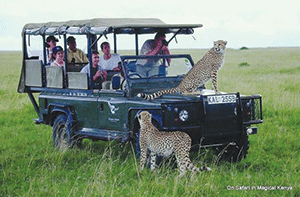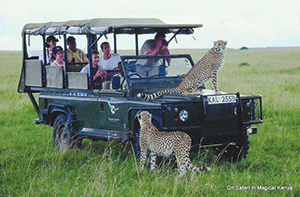Tourism is the first economic sector that heralds a country as a haven of peace when it is stable. But it is also the first to be affected by violence.
No one wants to visit a country and return as a corpse.
 And six years down the line, Kenya is still struggling to get its rhythm back from the shadows of violence that struck the country with the best Safari and beach in Africa.
And six years down the line, Kenya is still struggling to get its rhythm back from the shadows of violence that struck the country with the best Safari and beach in Africa.
At a recent tourism symposium, stakeholders from the East African country converged at the Sarova Whitesands Resort in Mombasa to listen to speakers and find the key to revival.
The discourse was dominated by the dire state of the industry, especially coastal resorts hard hit by anti-travel advisories issues by the United Kingdom and other European countries.
Tourism is one of Kenya’s leading hard currency earners, but the sector has been going through tough times for some years due to terrorism related attacks.
The violence became serious in 2007, at a time the country’s tourism was growing at 7 per cent per annum.
Hotels began to be empty up and down the coast after ethnic clashes killed more than 1,500 people and forced more than 600,000 to flee their homes in the wake of the disputed presidential election on December 27 that year.
Inland, the elephants, lions, and giraffes now have the country’s game reserves to themselves as safari companies divert to neighbouring Tanzania.
Sustained terrorism attacks on Nairobi, the tourism bedrock of Mombasa, and areas bordering Somalia have triggered Western nations to issue stern travel advisories to their citizens.
Two weeks ago, the UK, United States, Germany, and Canada – some of Kenya’s main sources of tourists – announced fresh travel bans.
Kenya lost over $60 million following cancellations after the travel bans.
A few years back, the white sands of Nyali beach, a coastal resort north of Mombasa, were dotted with European tourists; strolling, swimming, tanning, and spending money.
The winter high season saw fully booked hotels, maxed out safari tours, and daily flight charters in thousands of travellers in search of the exotic. Now, the beaches are empty, the crafts markets deserted, and many resorts closed.
All the tourism stakeholders and the government are working extra hard to push tourism back to its past glory, but it has been one very difficult story.
At the symposium, the main address by Sarova Hotel Chief Executive Officer (CEO), J.S. Vohra, was full of diplomatic niceties; he was unable to say much else but to thank the UK for lifting its crippling advisory.
His words: “It gives me great pleasure to welcome you all to another KAHC Symposium. This is the 13th time that we are congregating here to discuss matters pertaining to our beloved tourism industry.
“As you are all aware, the last three years have been very difficult for the industry. The worst being the imposition of travel advisories by the UK, U.S., French and Australian governments in May of last year.
“This brought the tourism industry to a virtual standstill. We saw properties shut down in Malindi, Mombasa, Diani, Lamu and Watamu and a lot of jobs in the industry were lost.
“KAHC, together with KTF, KATO, KCTA, PERAK and Ecotourism Kenya went on full gear to advocate for increased security and a review of the travel advisories.
“After more than one year of intense activities by all stakeholders, the UK finally reviewed its travel advisory against ‘non-essential’ travel to Mombasa, Diani and Watamu.”
Vohra disclosed that this year’s symposium theme, “Tourism Recovery – The Way Forward”, was selected long before the UK travel advisory was reviewed.
“It was, and still is, our belief that we can recover no matter what the circumstances may be.”
He thanked the government for allocating KShs 5.2 billion to tourism recovery, which “shows serious commitment by the government to the tourism industry.”
For Kenyan tourism to recover, Vohra sought the implementation of the following:
• Immediate release of recovery funds by the government.
• Formation of a recovery implementation committee in the same spirit as was the Tourism Recovery Task Force.
• Immediate implementation of the tourism task force report with a time frame.
• Immediate formation of Tourism Parastatal Boards of KTB, Tourism Fund, Kenya Utalii College, Tourism Finance Corporation, and the Tourism Regulatory Authority.
• Immediate marketing blitz by KTB within the source markets.
• Immediate commencement of negotiations with airline partners both scheduled and charter, so that they can start flying tourists to Kenya.
• Capacity building of the TPU in terms of equipment and personnel in order to secure our citizens and visitors.
• Monthly updates from the appointed international public relations agency.
Vohra warned that “a mountain of work” needs to be done by tourism stakeholders, primarily those from the public sector but also from the private sector.
It is also clear, he added, that there is increasing frustration with the slow response by government to key issues raised over the past several years by the industry and which were again reflected in the report of the tourism recovery task force.














